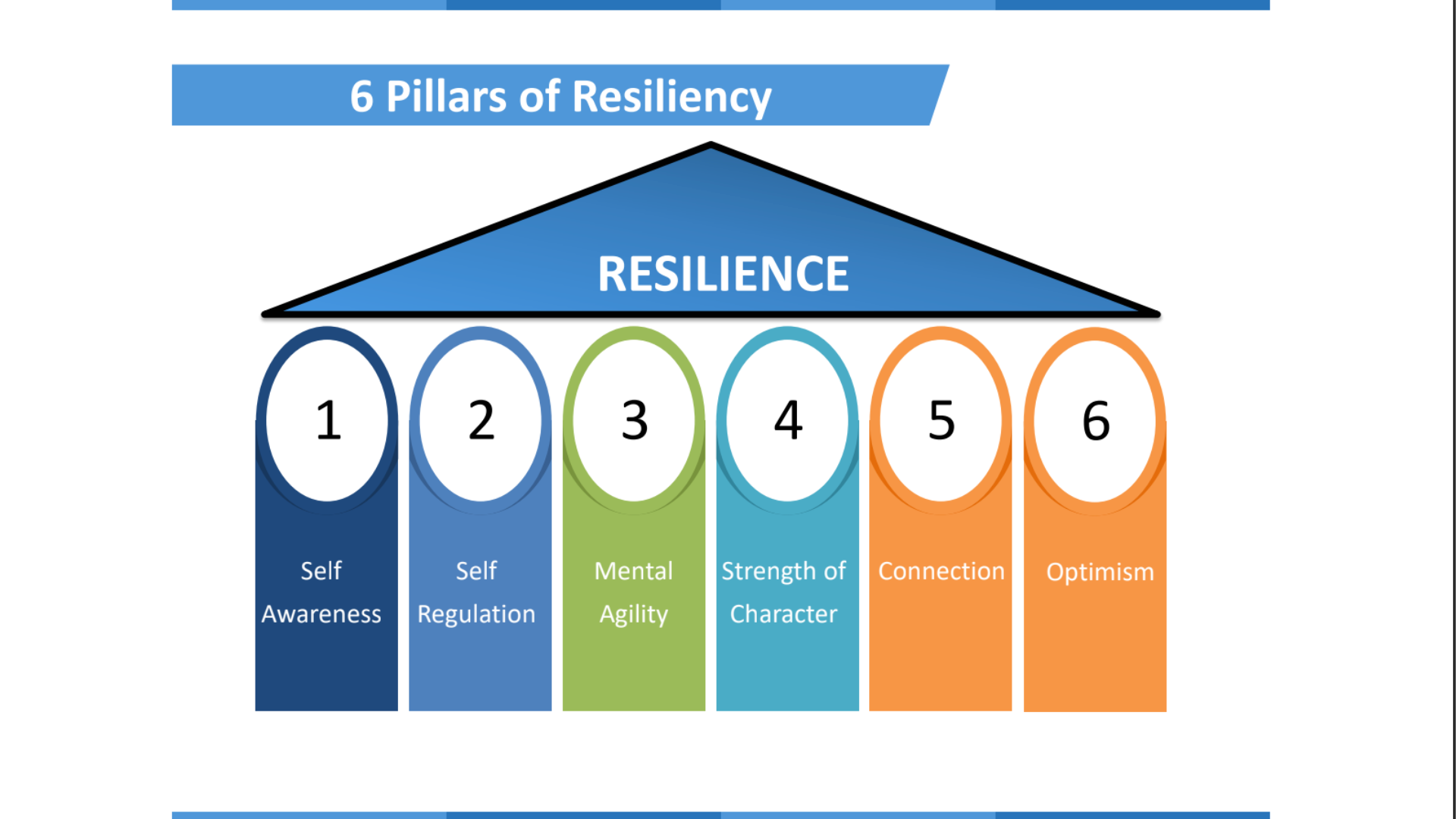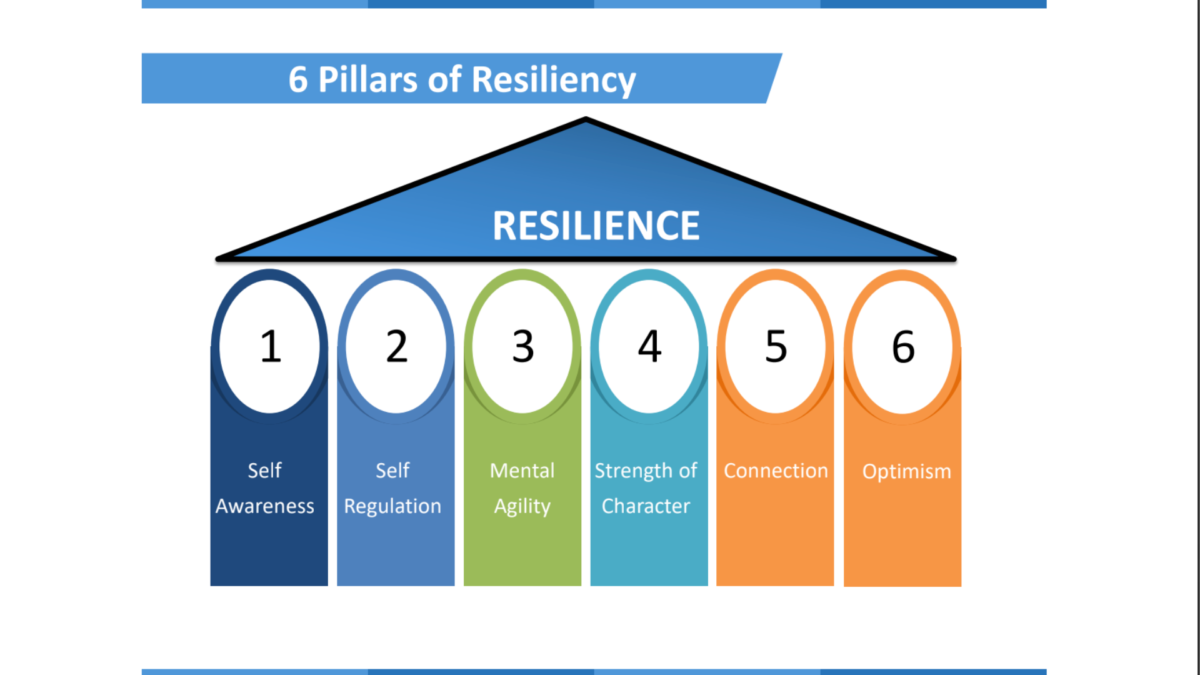The 6 Pillars of Resilience:
How to Strengthen Them for Personal and Professional Growth

Resilience is a skillset that can be developed
Resilience is more than just the ability to recover from setbacks; it’s a dynamic skillset that can be developed and refined. At the core of resilience are six fundamental traits. Understanding and nurturing these pillars can lead to significant growth in both your personal and professional life. Let’s explore why these traits are essential and how you can boost each one to your advantage.
Self-Awareness
Why It’s Important: Self-awareness is the cornerstone of personal growth. It involves recognizing your emotions, thoughts, and behaviors, and understanding how they impact your decisions and interactions with others. In both personal and professional settings, self-awareness allows you to make conscious choices that align with your values and goals.
How to Boost It:
- Reflect Regularly: Take time each day to reflect on your experiences, emotions, and reactions. Journaling can be a powerful tool for this.
- Seek Feedback: Ask for feedback from trusted colleagues, friends, or mentors to gain insight into how others perceive you.
- Mindfulness Practices: Engage in mindfulness exercises like meditation or deep breathing to become more attuned to your inner state.
Self-Regulation
Why It’s Important: Self-regulation is the ability to manage your emotions, thoughts, and behaviors in different situations. It enables you to stay calm under pressure, control impulsive reactions, and respond thoughtfully rather than reactively.
How to Boost It:
- Develop Emotional Intelligence: Learn to identify and label your emotions accurately, which is the first step in managing them effectively.
- Practice Stress Management: Techniques such as progressive muscle relaxation, deep breathing, or mindfulness can help you stay calm in stressful situations.
- Set Clear Boundaries: Establish boundaries that protect your time, energy, and emotional wellbeing, helping you to maintain balance in your life.
Mental Agility
Why It’s Important: Mental agility is the ability to think flexibly, adapt to new situations, and see challenges from multiple perspectives. It helps you navigate complex problems, make quick decisions, and innovate in the face of change.
How to Boost It:
- Cultivate Curiosity: Stay open to new ideas and experiences. Read widely, ask questions, and explore different perspectives.
- Engage in Problem-Solving: Regularly challenge yourself with puzzles, strategy games, or scenarios that require creative thinking.
- Embrace Change: Rather than resisting change, practice viewing it as an opportunity for growth and learning.
Strength of Character
Why It’s Important: Strength of character involves integrity, perseverance, and the courage to stand by your principles, even in difficult circumstances. It’s what drives you to do the right thing, even when it’s not the easy thing.
How to Boost It:
- Clarify Your Values: Identify the core values that guide your decisions and actions, and commit to living by them consistently.
- Practice Perseverance: Set challenging goals and work towards them with determination, even when you encounter obstacles.
- Embrace Accountability: Hold yourself accountable for your actions, and be willing to admit mistakes and learn from them.
Connection
Why It’s Important: Human connection is a fundamental pillar of resilience. Building and maintaining strong relationships provides emotional support, enhances collaboration, and fosters a sense of belonging, all of which are vital for both personal and professional resilience.
How to Boost It:
- Invest in Relationships: Make time for meaningful interactions with family, friends, and colleagues. Show genuine interest in others and be present in your conversations.
- Offer Support: Be there for others in times of need, and don’t hesitate to ask for help when you need it. Mutual support strengthens bonds.
- Network Actively: Build professional networks by attending events, joining groups, and staying connected with peers in your industry.
Optimism
Why It’s Important: Optimism is the ability to maintain a positive outlook and focus on the potential for positive outcomes, even in challenging situations. It fuels resilience by helping you stay motivated and persistent, and by reducing the impact of stress.
How to Boost It:
- Practice Gratitude: Regularly reflect on the positive aspects of your life, and express gratitude for them. This shifts your focus from what’s wrong to what’s right.
- Reframe Negative Thoughts: Challenge negative thinking patterns by reframing challenges as opportunities for growth and learning.
- Set Positive Goals: Focus on what you want to achieve rather than what you want to avoid. Positive, goal-oriented thinking can drive you forward with purpose.
Conclusion
Resilience is not just about surviving tough times—it’s about thriving in the face of adversity. By strengthening these six pillars of resilience you can enhance your ability to navigate life’s challenges with grace and determination.
At The Resiliency Solution, we believe in empowering individuals to build these traits for success in both their personal and professional lives. By consciously cultivating these pillars, you can create a solid foundation of resilience that will support you through whatever life throws your way.







